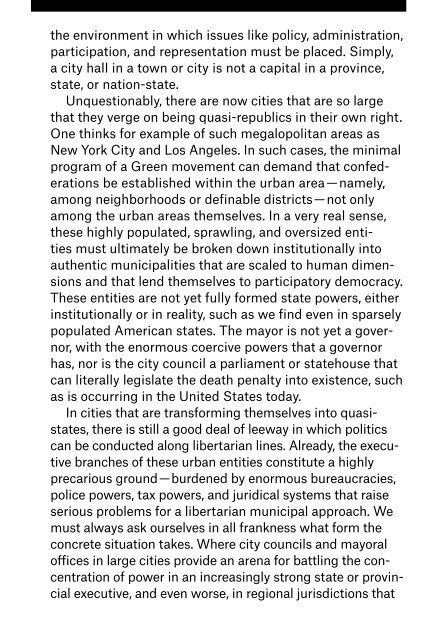Stateless Democracy
1RHiH4Y
1RHiH4Y
Create successful ePaper yourself
Turn your PDF publications into a flip-book with our unique Google optimized e-Paper software.
the environment in which issues like policy, administration,<br />
participation, and representation must be placed. Simply,<br />
a city hall in a town or city is not a capital in a province,<br />
state, or nation-state.<br />
Unquestionably, there are now cities that are so large<br />
that they verge on being quasi-republics in their own right.<br />
One thinks for example of such megalopolitan areas as<br />
New York City and Los Angeles. In such cases, the minimal<br />
program of a Green movement can demand that confederations<br />
be established within the urban area — namely,<br />
among neighborhoods or definable districts — not only<br />
among the urban areas themselves. In a very real sense,<br />
these highly populated, sprawling, and oversized entities<br />
must ultimately be broken down institutionally into<br />
authentic municipalities that are scaled to human dimensions<br />
and that lend themselves to participatory democracy.<br />
These entities are not yet fully formed state powers, either<br />
institutionally or in reality, such as we find even in sparsely<br />
populated American states. The mayor is not yet a governor,<br />
with the enormous coercive powers that a governor<br />
has, nor is the city council a parliament or statehouse that<br />
can literally legislate the death penalty into existence, such<br />
as is occurring in the United States today.<br />
In cities that are transforming themselves into quasistates,<br />
there is still a good deal of leeway in which politics<br />
can be conducted along libertarian lines. Already, the executive<br />
branches of these urban entities constitute a highly<br />
precarious ground — burdened by enormous bureaucracies,<br />
police powers, tax powers, and juridical systems that raise<br />
serious problems for a libertarian municipal approach. We<br />
must always ask ourselves in all frankness what form the<br />
concrete situation takes. Where city councils and mayoral<br />
offices in large cities provide an arena for battling the concentration<br />
of power in an increasingly strong state or provincial<br />
executive, and even worse, in regional jurisdictions that<br />
may cut across many such cities (Los Angeles is a notable<br />
example), to run candidates for the city council may be the<br />
only recourse we have, in fact, for arresting the development<br />
of increasingly authoritarian state institutions and helping to<br />
restore an institutionally decentralized democracy.<br />
It will no doubt take a long time to physically decentralize<br />
an urban entity such as New York City into authentic<br />
municipalities and ultimately communes. Such an effort<br />
is part of the maximum program of a Green movement.<br />
But there is no reason why an urban entity of such a huge<br />
magnitude cannot be slowly decentralized institutionally.<br />
The distinction between physical decentralization and<br />
institutional decentralization must always be kept in mind.<br />
Time and again excellent proposals have been advanced<br />
by radicals and even city planners to localize democracy in<br />
such huge urban entities and literally give greater power<br />
to the people, only to be cynically shot down by centralists<br />
who invoke physical impediments to such an endeavor.<br />
It confuses the arguments of advocates for decentralization<br />
to make institutional decentralization congruent<br />
with the physical breakup of such a large entity. There is<br />
a certain treachery on the part of centralists in making<br />
these two very distinct lines of development identical or<br />
entangling them with each other. Libertarian municipalists<br />
must always keep the distinction between institutional and<br />
physical decentralization clearly in mind, and recognize<br />
that the former is entirely achievable even while the latter<br />
may take years to attain.<br />
Murray Bookchin was a libertarian socialist author and a pioneer in the<br />
ecological movement. This essay first appeared in Green Perspectives<br />
20 on 3 November 1990. It was recently republished in the collection<br />
of essays by Bookchin The Next Revolution. Popular Assemblies & The<br />
Promise of Direct <strong>Democracy</strong> (London and New York: Verso Books,<br />
2015) edited by Debbie Bookchin and Blair Taylor. It appears here in<br />
lightly edited form with permission of the editors.



